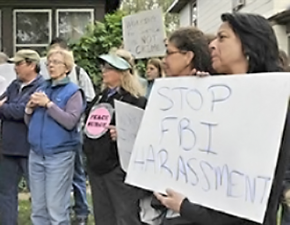Activists targeted in FBI raids
and report on a new FBI crackdown against activists.
FBI AGENTS raided the homes of several Twin Cities and Chicago-area antiwar activists and socialists, reportedly looking for evidence of "material support for terrorism."
Emergency community meetings drew out more than 150 activists in Minneapolis, and another 80 in Chicago to discuss opposition to the raids and next steps to support those affected.
The raids began Friday morning, September 24, and included at least five houses and the office of the Twin Cities Anti-War Committee in Minneapolis, and one house and an apartment in Chicago. Although there were no arrests, at least a dozen activists have reportedly received grand jury subpoenas for October 5 in Chicago.
The activists targeted are involved in numerous groups, including: the Palestine Solidarity Group, Students for a Democratic Society, the Twin Cities Anti-War Committee, the Colombia Action Network, the Freedom Road Socialist Organization (FRSO), and the National Committee to Free Ricardo Palmera (a Colombian political prisoner).

Boxes of papers as well as electronic equipment were seized by agents reportedly looking for links between the activists and the Revolutionary Armed Forces of Colombia (FARC), the Popular Front for the Liberation of Palestine (PFLP) and the Lebanese Islamic group Hezbollah--all groups on the State Department's list of foreign terrorist organizations.
As Twin Cities Indymedia reported,
The search warrant for 1823 Riverside, the residence of activist Mick Kelly, sought information "regarding ability to pay for his own travel" to Palestine and Columbia from 2000 to today. The warrant hyped potential documents indicating any contacts/facilitation with FARC, PFLP, and Hezbollah--what it called "FTOs" or "foreign terrorist organizations." It mentioned seeking information on the alleged "facilitation of other individuals in the U.S. to travel to Colombia, Palestine and any other foreign location in support of foreign terrorist organizations including but not limited to FARC, PFLP and Hezbollah."
The wording of the warrant appears to indicate the government seeks to create divisions among social justice and international solidarity activists by hyping alleged connections to what they call "foreign terrorist organizations."
The warrant also sought information on "Kelly's travel to and from and presence in MN, and other foreign countries [sic] to which Kelly has traveled as part of his work in FRSO [Freedom Road Socialist Organization], as well as materials related to his finances and the finances of FRSO, and all computer and electronic devices.
IN CHICAGO, those targeted include Service Employees International Union steward Joe Iosbaker and his partner, veteran activist Stephanie Weiner.
At an emergency meeting and press conference the day after the raid on their house, Iosbaker and Weiner described how FBI agents spent 12 hours rifling through documents and taking computers and papers--including their children's artwork and poetry--from their home.
"It's pretty hard to control the anger we feel," Iosbaker said. "All we ever did was work against the U.S. involvement with Colombia and Israel, and we support the people for justice...These raids, searches and grand jury investigations are nothing more than an attempt to intimidate us and to intimidate the antiwar movement. We have done nothing wrong."
The more than 80 activists who crammed into the West Town Community Law Office represented many social movements, unions and organizations from across the cities. Attendees pledged to defend the FBI raid victims and to challenge government repression.
"The U.S. government is trying to intimidate people from supporting the struggles of people around the world," said Melinda Powers, an attorney who represents some of the subpoenaed activists.
Following the raids in Chicago, an FBI spokesperson admitted to the Associated Press that the bureau knew of no "imminent threat to the community"--suggesting that the raids are part of a government fishing expedition.
In the wake of several high-profile cases in which the Bush administration attacked U.S.-based Muslim charities for supposed "material support to terrorism," this current attack on activists by the Obama administration is a powerful reminder that our civil liberties--including the right to speak out against U.S. wars and interventions around the globe--remain at risk.
In reality, whether or not U.S. activists may have traveled abroad or met with members of FARC or the PFLP is beside the point. The U.S. government has a long and sordid history of labeling those fighting against oppression and imperialism as "terrorists"--including, for example, the Nelson Mandela and the African National Congress, during the anti-apartheid struggle--even as it funnels billions of dollars in aid each year to repressive governments around the globe, with Colombia and Israel among the biggest recipients. In fact, it was not until 2008 that the ANC was finally removed from the government's terrorist watch list.
As a statement by the Twin Cities Anti-War Committee noted, "This suppression of civil rights is aimed at those who dedicate their time and energy to supporting the struggles of the Palestinian and Colombian peoples against U.S. funded occupation and war."
The threat to free speech posed by these raids is serious, and demands an immediate and united response. Protests are planned at FBI offices and federal buildings in almost 20 cities across the country on Monday, Tuesday and Wednesday.
In Chicago, more than 40 activists attended an emergency organizing meeting on Sunday to form the Committee Against Political Repression. Organizers discussed the long history of repression against socialist, labor and antiwar activists in the U.S., including the 1920s Palmer raids, the 1940 Smith Act, the McCarthy witch-hunts and Red Scare of the 1950s and the FBI's COINTELPRO in the 1960s and '70s.


